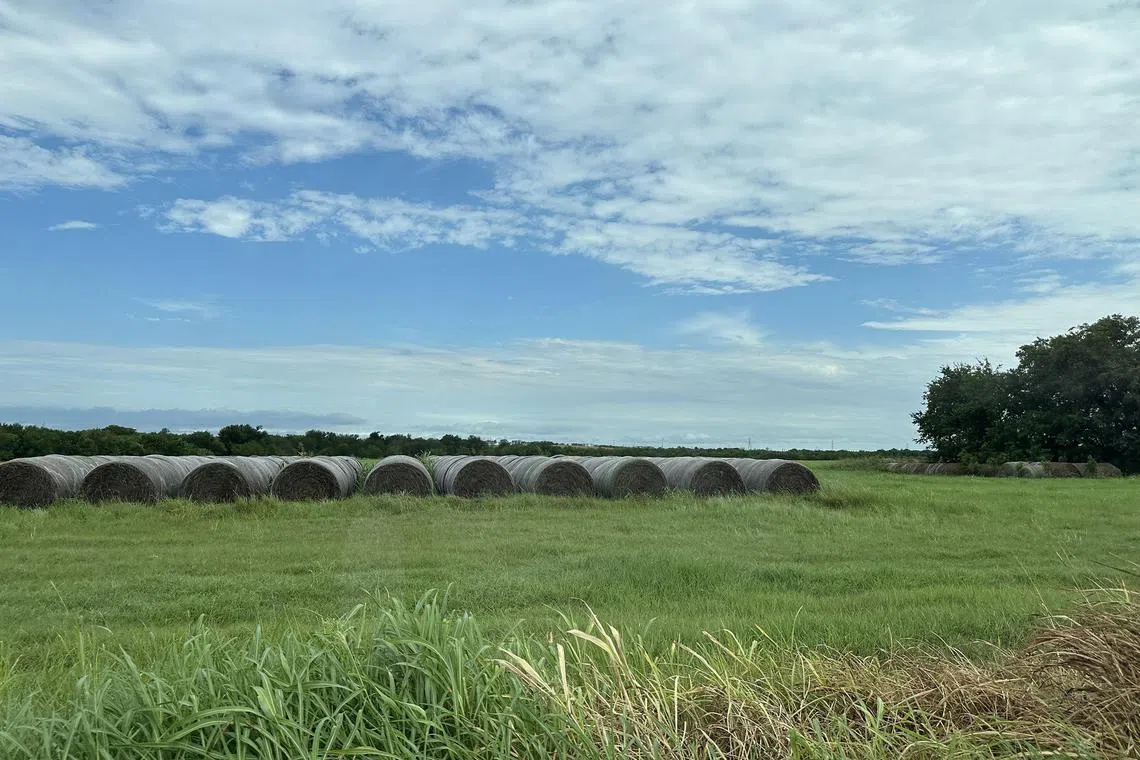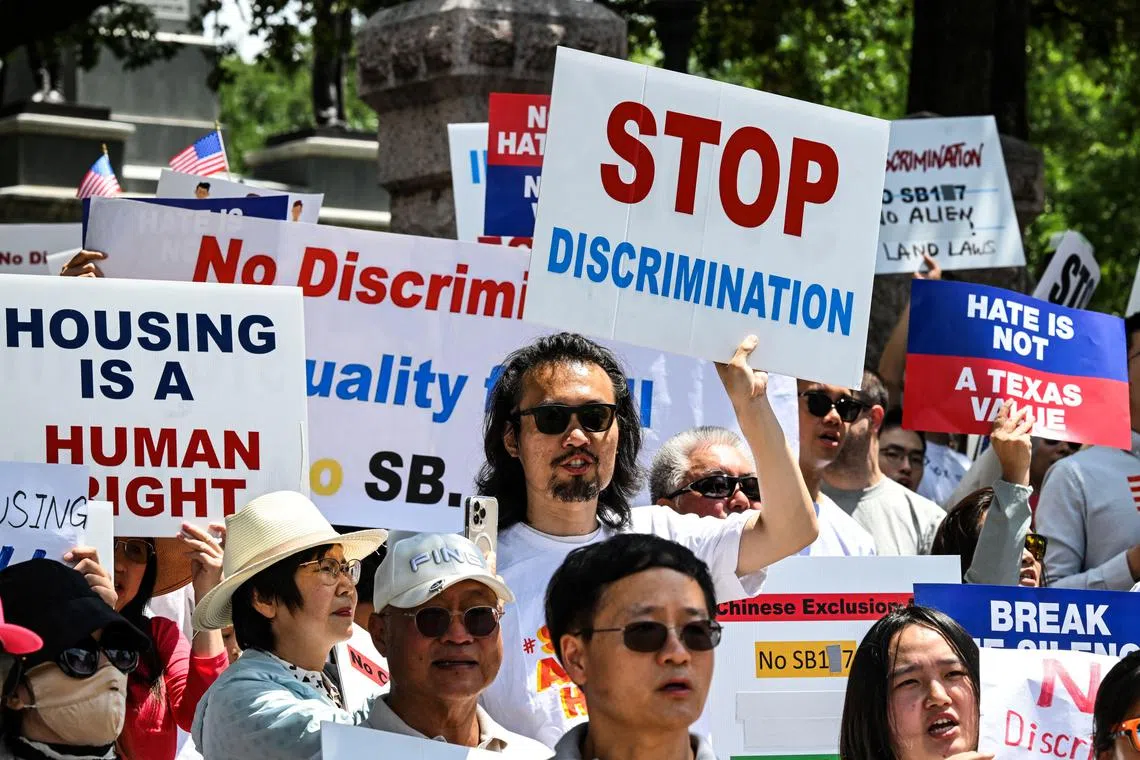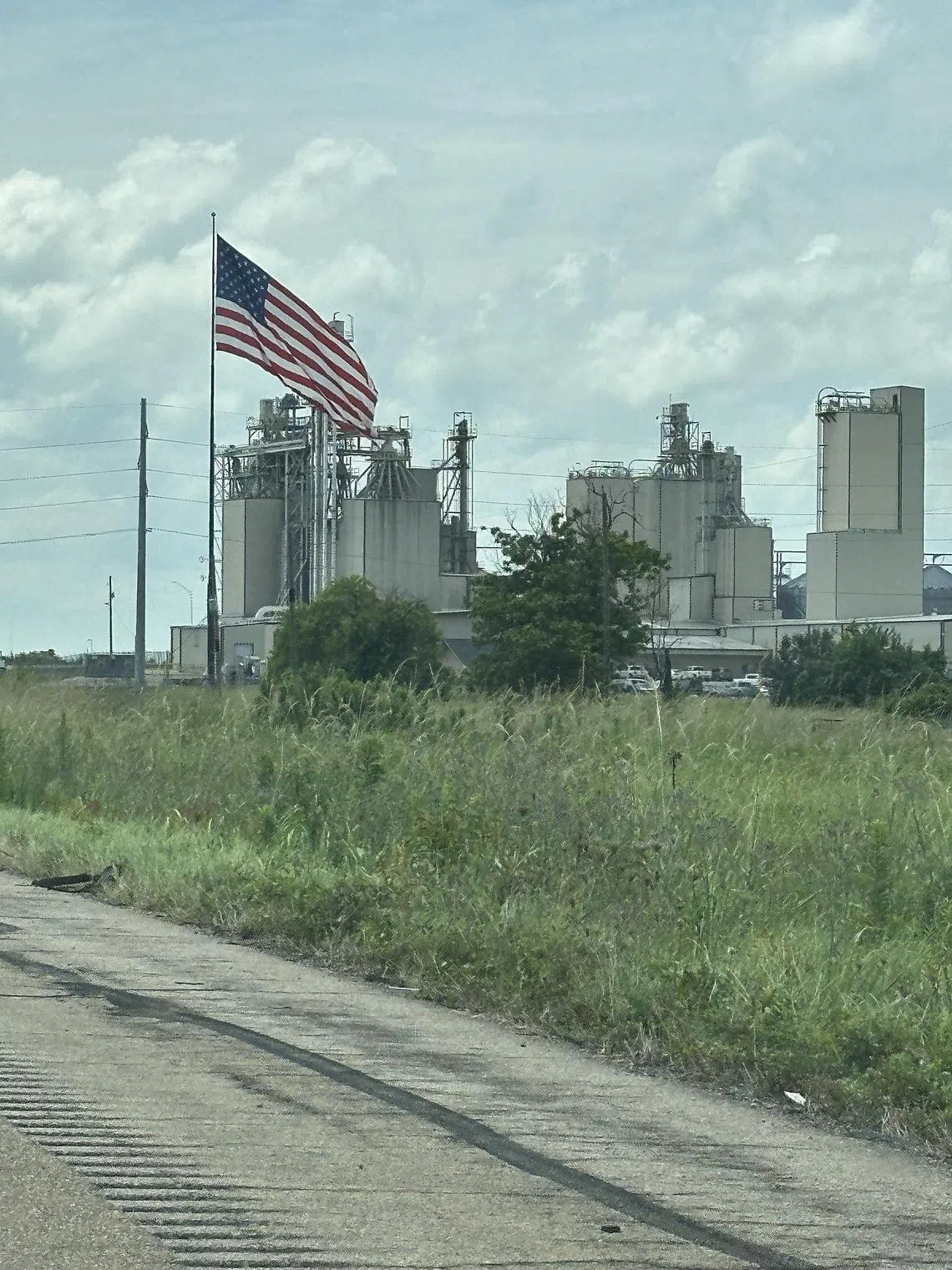Sweeping Texas law barring Chinese land ownership is racist, say critics
Sign up now: Get ST's newsletters delivered to your inbox

A sweeping new law in Texas that took effect on Sept 1 prohibits the sale of homes, commercial spaces and farmland to entities from China.
ST PHOTO: BHAGYASHREE GAREKAR
AUSTIN, Texas – The US-China rivalry has landed hard in America’s heartland, thanks to a new law that restricts property ownership by Chinese citizens and businesses.
Effective from Sept 1, the sweeping law in Texas – America’s second-largest state and its second-largest economy – prohibits the sale of homes, shops and farmland to entities from China.
Also excluded are three other nations deemed adversarial: Russia, North Korea and Iran.
Permanent residents are exempt, while students and work visa holders are allowed to buy one home as their residence, but not additional properties for investment.
Supporters say the law is prompted by concerns over national security, to keep China’s growing appetite for property abroad in check.
Critics maintain it legitimises harmful and racist claims about immigrants, and can encourage hostility and increase the incidence of anti-Asian violence.
They say it sends the message that Asian Americans are unwelcome, that they do not belong.
Texas Governor Greg Abbott, a member of US President Donald Trump’s Republican Party, has bragged that the law is the “toughest ban in America”.
“Hostile foreign adversaries like China, Russia, Iran and North Korea, as well as foreign terrorist organisations like Tren de Aragua, must not be allowed to own land in Texas,” Mr Abbott said in a press statement a few days before the law took effect. Tren de Aragua is a Venezuelan criminal organisation.
“They should not be allowed access to our critical infrastructure, and they may not be allowed to exploit our border. Stiff, criminal penalties will be inflicted on those who violate these laws,” he said.

Protesters in front of the Texas State Capitol in Austin on May 10 rallying against a Bill that aims to ban citizens and entities from countries such as China from buying properties in Texas.
PHOTO: AFP
Penalties for violation include jail terms and fines of more than US$250,000 (S$322,200).
What partly prompted the law was the purchase of 56,656ha of land near an air force base in Texas by Chinese businessman Sun Guangxin between 2016 and 2018. It did not seem to matter that the deal had been cleared by the federal authorities.
“The US is under pervasive threat from the Chinese Communist Party, from Russia, from Iran and from North Korea,” said Mr Brian Cavanaugh, a national security expert who testified in hearings called by the Texas legislature when the law was under consideration. Mr Cavanaugh has since been appointed associate director for homeland security in the Office of Management and Budget at the White House.
“It is not a conflict where we are targeting military versus military,” he said. “They have actually taken an asymmetric approach, targeting civilian critical infrastructure. It is economic warfare, lawfare and a fundamental threat to the general population.”
China has called the law discriminatory.
“The US overstretches the concept of national security and deprives the right of institutions and citizens of particular countries to purchase farmland,” Chinese Embassy spokesman Liu Pengyu told The Straits Times.
“This is typically discriminatory and violates the principle of market economy and international trade rules,” he said, adding that the law would eventually hurt the US’ own interests.
“We urge the US to immediately stop politicising trade and investment issues.”
Foreign ownership of land is not new. Foreign entities, from mostly friendly nations, own about 3 per cent of US farmland nationwide. China owns less than 1 per cent of that 3 per cent.
According to the US Department of Agriculture (USDA), China-linked investors owned 112,234ha of agricultural land as at Dec 31, 2023, based on filings to the government.
Iranian interests reported owning 1,226ha; North Korea had no land; and Russian investors reported 4.5ha.
Much of the Chinese-controlled land is owned by Smithfield Foods, which was acquired in 2013 by the WH Group, a Chinese conglomerate led by tycoon Wan Long.
However, Chinese entities own more land in Texas than in any other state.
There has been a sharp blowback against the new Texas law from the state’s Chinese American community. “It is plainly racist, and our community will not stand for it,” said Mr Gene Wu, a Democratic lawmaker from Houston, one of the most diverse State House Districts in the legislature.
Houston, which is home to a sizeable Asian American community, is the largest city in Texas. Almost 86 per cent of residents in Mr Wu’s legislative district, which includes south-western Houston, are non-white, and 71 per cent speak a language other than English at home.
Mr Wu, who immigrated from Guangzhou as a child, is a lawyer who was first elected in 2012 and currently chairs the Democratic Caucus in the Texas House of Representatives.
“It (the law) does nothing more than send us backwards to a time when Asian Americans were openly told they didn’t belong,” he observed, in a reference to the infamous Chinese Exclusion Act of 1882, which barred the immigration of Chinese labourers to the US.
“What they are talking about is home ownership, business ownership. It is basically saying, ‘no Asians, no Chinese are welcome here’.”
The fear is that the law promotes racial profiling against citizens and non-citizens who want to buy or rent property. And not just that – it could implicate the sellers, too.
“The average person on the street couldn’t tell you if somebody is Chinese, Japanese, Korean or Vietnamese,” Mr Wu said. “And not only that, people aren’t going to be able to tell who is a citizen, who is a green card holder.”
He said the law would affect all Asian Americans. It would discourage land owners and real estate companies from selling property to Asians for fear of breaking the law.
“They are going to discriminate against anyone who looks Asian on the off chance they might be Chinese and they might be an immigrant,” Mr Wu said.
At a public hearing on the Bill in March, such fears were raised.
“This is a dangerous, dangerous place for our society to be. If this Bill passes, there will be more hate crimes and anti-Asian incidents against Asian grandmas and grandpas, and their blood will be on your hands,” said one person.
But protests against the law have been markedly muted. They would have been much louder but for the fact the Trump administration’s hardline immigration policies have raised the possibility of government retribution, according to Mr Michael Wei, a board member of the Austin Chinese-American Network.
“If they show up to do something, they are going to record (you) on camera, then (they are) going to be tracking your visa, reviewing your visa or even revoking your green card,” he said in recent comments to local media.
There have been some legal challenges, to be sure.

According to USDA, China-linked investors owned 112,234ha of agricultural land as at Dec 31, 2023, based on filings to the government.
ST PHOTO: BHAGYASHREE GAREKAR
In July, the Chinese American Legal Defence Alliance, a non-profit organisation, filed a lawsuit on behalf of three Chinese citizens challenging the legislation as “unconstitutional”. Their case was dismissed after the government argued that the law did not directly affect them.
Data from 2023 showed that Texas is home to at least 120,000 people born in China.
As at Aug 20, six states are considering 22 Bills that would restrict foreign property ownership in some way, while the US Congress is currently considering 18 similar Bills.
Some 30 states have already passed 54 Bills that restrict foreign property ownership, with most legislative activity having taken place since 2021. Many of these date from 2023, when a Chinese surveillance balloon flew over US airspace and roiled bilateral relations. While the US called it a “spy balloon” hovering over US defence facilities, China maintained it was a weather balloon that had strayed.
The new Texas law is broader than the National Farm Security Action Plan announced by USDA in July. The federal plan was aimed at curbing the purchase or control of US farmland, whereas the Texas law targets commercial and residential property as well.
The Asian American community fears the Texas law will go national. “Texas is a small piece of this. The bigger battle is going to be on Capitol Hill. The bigger battle is coming to DC,” Mr Wu predicted.
“The rise of anti-Asian hate is not only unabated, but it is increasing in volume.”
US states are not in a strong position to assess national security risks, Associate Professor Sarah Bauerle Danzman from Indiana University Bloomington, a senior fellow at the Atlantic Council, told ST.
“At the federal level, the Committee on Foreign Investment in the United States (CFIUS) already has the authority to review foreign investor real estate transactions co-located by sensitive sites,” she pointed out.
“Allowing CFIUS to handle such reviews is preferable to a state-by-state review or prohibition regime,” she said, adding that the federal government can draw on the intelligence community, including agencies like the Federal Bureau of Investigation and the Central Intelligence Agency, to make rigorous, fact-based assessments of any risks.
“If states such as Texas are concerned that CFIUS may be unaware of certain transactions, it would be better to focus on gathering information about such deals and requesting that CFIUS undertake reviews.”



